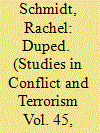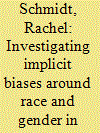|
|
|
Sort Order |
|
|
|
Items / Page
|
|
|
|
|
|
|
| Srl | Item |
| 1 |
ID:
188378


|
|
|
|
|
| Summary/Abstract |
In narratives around insurgencies, terrorism, and other forms of political violence, the media—and policymakers—frequently portray women as victims or unintelligent pawns of men. But these violent women get more media attention than their male counterparts because they are a shocking departure from gendered expectations of nurturing, peaceful women. However, even such narratives of deviance can reinforce societal stereotypes about women by emphasizing that they are emotional but not political, easily manipulated, often deranged, or simply unintelligent. Using in-depth interviews in Ireland and the United Kingdom with practitioners in counter terrorism (CT) and countering violent extremism (CVE), this paper argues that a failure to ask meaningful questions about women’s roles in extremist violence has reinforced gender stereotypes, leading to disengagement and deradicalization practices that ignore or downplay women’s importance in fostering violence.
|
|
|
|
|
|
|
|
|
|
|
|
|
|
|
|
| 2 |
ID:
070541


|
|
|
|
|
| Publication |
Santa Monica, Rand Corporation, 1994.
|
| Description |
xxiii, 116p.
|
| Standard Number |
0833014943
|
|
|
|
|
|
|
|
|
|
|
|
Copies: C:1/I:0,R:0,Q:0
Circulation
| Accession# | Call# | Current Location | Status | Policy | Location |
| 035425 | 338.43629133340973/PIN 035425 | Main | On Shelf | General | |
|
|
|
|
| 3 |
ID:
178200


|
|
|
|
|
| Summary/Abstract |
A growing body of research on terrorism and countering violent extremism (CVE) has increasingly questioned the lack of attention to—and myths around—women involved in extremist and political violence, while other research has drawn attention to racial and religious stereotypes that affect national security policies and practices worldwide. While Canada is often heralded as a global leader in multiculturalism and gender equality, the nation’s national security sector still faces significant challenges around implicit biases related to race and gender. This study asks whether gender and racial stereotypes impeding counterterrorism and CVE in other countries are also affecting policies and practices in Canada. Using twenty-six in-depth interviews with practitioners, police officers, academics, and government officials from seven major cities across Canada, this paper argues that persistent gender and racial stereotypes are indeed a key challenge impeding Canada’s efforts to adequately address radicalization into and disengagement from extremist violence.
|
|
|
|
|
|
|
|
|
|
|
|
|
|
|
|
| 4 |
ID:
178918


|
|
|
|
|
| Summary/Abstract |
In research on terrorism and political violence, “fieldwork” now means many things. Scholars conduct interviews online, meet former extremists in urban centers, and travel across the globe to interview ex-combatants. But in this world of social media and constant connectivity, it is no longer possible to fully leave the “field.” Complicating matters is that researchers often do not speak openly about the ethical dilemmas they face—both during and after fieldwork—fearing it might damage their credibility. While various scholars have explored the ethical complexities of fieldwork in conflict-affected areas, there has been little discussion in political science on ethical challenges after fieldwork, and even less on how these post-fieldwork experiences are often highly gendered. Once fieldwork is over, what challenges do researchers face, what are researchers’ obligations to participants, and what types of regulations guide this behavior—especially when participants are former violent actors? What are the power dynamics between researchers and participants, how does gender affect these dynamics, and how do these relationships guide future interactions? For example, how do researchers deal with post-fieldwork requests for money or assistance? And how do scholars decide what to publish, and when, if they have received threats, or if threats to their participants change? Based on my experiences conducting over hundred interviews across Colombia, this paper argues that ethical review processes lack adequate consideration of ongoing ethical issues after fieldwork in conflict-affected environments, especially regarding contact with former insurgents. In addition, I argue that the tension between demands for transparency and adequately protecting both participants and researchers creates a disincentive to have open conversations about these dilemmas—especially among junior scholars.
|
|
|
|
|
|
|
|
|
|
|
|
|
|
|
|
|
|
|
|
|